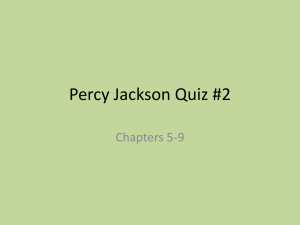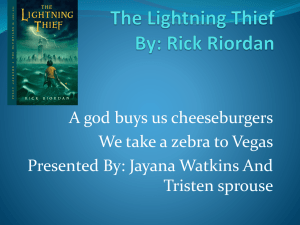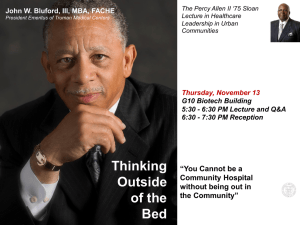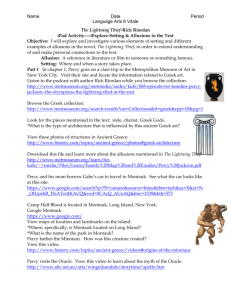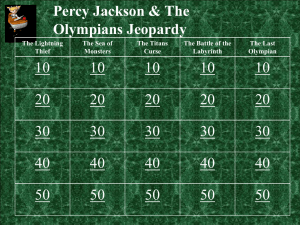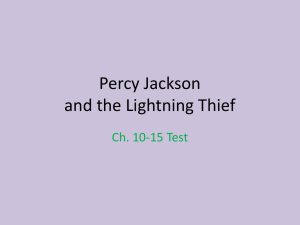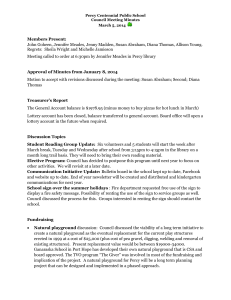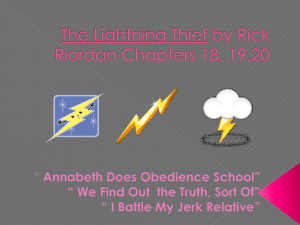Sea of Monsters Literature Circle Guide
advertisement
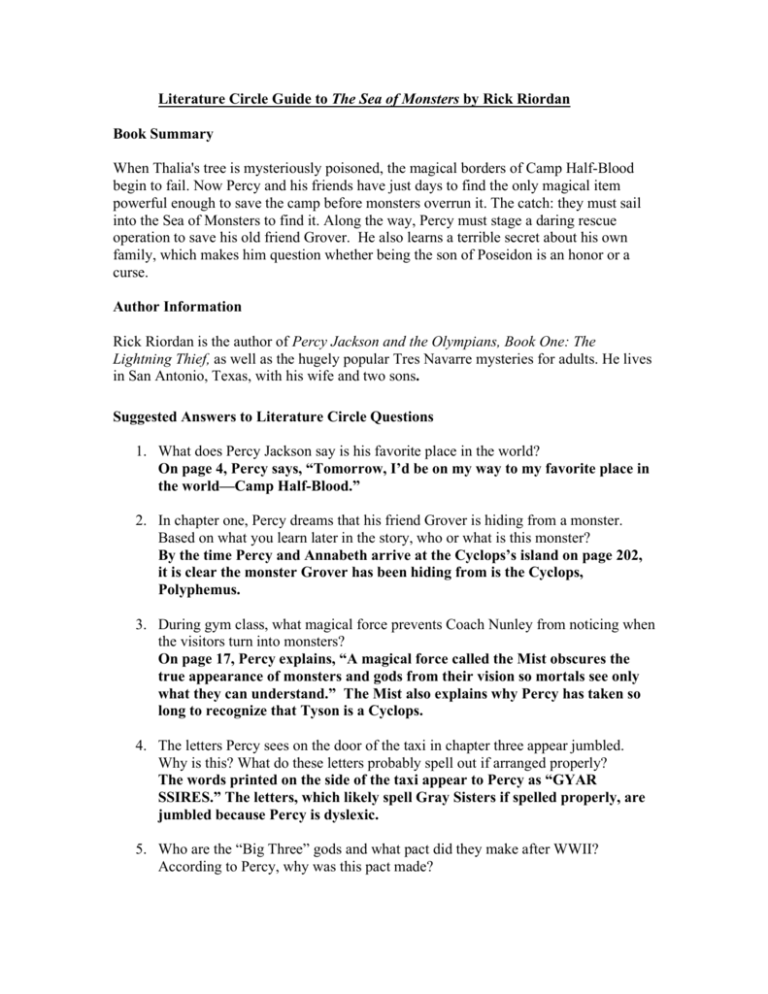
Literature Circle Guide to The Sea of Monsters by Rick Riordan Book Summary When Thalia's tree is mysteriously poisoned, the magical borders of Camp Half-Blood begin to fail. Now Percy and his friends have just days to find the only magical item powerful enough to save the camp before monsters overrun it. The catch: they must sail into the Sea of Monsters to find it. Along the way, Percy must stage a daring rescue operation to save his old friend Grover. He also learns a terrible secret about his own family, which makes him question whether being the son of Poseidon is an honor or a curse. Author Information Rick Riordan is the author of Percy Jackson and the Olympians, Book One: The Lightning Thief, as well as the hugely popular Tres Navarre mysteries for adults. He lives in San Antonio, Texas, with his wife and two sons. Suggested Answers to Literature Circle Questions 1. What does Percy Jackson say is his favorite place in the world? On page 4, Percy says, “Tomorrow, I’d be on my way to my favorite place in the world—Camp Half-Blood.” 2. In chapter one, Percy dreams that his friend Grover is hiding from a monster. Based on what you learn later in the story, who or what is this monster? By the time Percy and Annabeth arrive at the Cyclops’s island on page 202, it is clear the monster Grover has been hiding from is the Cyclops, Polyphemus. 3. During gym class, what magical force prevents Coach Nunley from noticing when the visitors turn into monsters? On page 17, Percy explains, “A magical force called the Mist obscures the true appearance of monsters and gods from their vision so mortals see only what they can understand.” The Mist also explains why Percy has taken so long to recognize that Tyson is a Cyclops. 4. The letters Percy sees on the door of the taxi in chapter three appear jumbled. Why is this? What do these letters probably spell out if arranged properly? The words printed on the side of the taxi appear to Percy as “GYAR SSIRES.” The letters, which likely spell Gray Sisters if spelled properly, are jumbled because Percy is dyslexic. 5. Who are the “Big Three” gods and what pact did they make after WWII? According to Percy, why was this pact made? On page 50, Percy explains, “The ‘Big Three’ gods—Zeus, Poseidon, and Hades—had made a pact after WWII not to have any more children with mortals. We were more powerful than regular half-bloods. We were too unpredictable. When we got mad, we tended to cause problems…like World War II, for instance.” 6. List three items that Hermes gives to Percy for his journey and explain one way in which each of these items helps the heroes on their quest. Hermes gives Percy a thermos which releases the winds, a bottle of vitamins, and a duffel bag containing clothes, cash, toiletries, rations, and drachmas. On page 135, a drachma is used to contact Chiron and the thermos is used to propel Annabeth, Percy, and Tyson from Luke’s boat. On page 182, Percy uses a vitamin to restore himself after being turned into a guinea pig. On page 235, the cash is used for Clarisse’s return ticket to Camp Half-Blood from Miami. 7. Late in the book, Chiron tells Percy, Tyson, and Annabeth that they are “all true heroes.” Choose one moment from the quest when you think Percy, Tyson, or Annabeth acts heroically and explain why you think the character is heroic at this moment. Examples might include Tyson battling the Cyclops in chapter 16, Annabeth saving Percy from Circe, or Percy saving Annabeth from drowning near the island of the Sirens. 8. In the story, Percy is able to command the sea, while Tyson has great strength and keen senses of smell and hearing. Imagine you are the son or daughter of a god and possess an extraordinary ability. Describe the ability you would choose for yourself and how you might use it on the quest. Answers will vary widely but the ability a student chooses should be of the sort a hero in the book might possess. The ability to fly or become invisible is not as good an answer as the ability to harness some natural force or to use some unusually strong sense. In other words, students should be able to distinguish between the abilities of the gods and those of superheroes. 9. On page 199, Annabeth tells Percy that her fatal flaw is hubris. What does she say hubris means? Briefly describe one time when you or someone you know acted with hubris. Annabeth says, “Hubris means deadly pride, Percy. Thinking you can do things better than anyone else…even the gods.” 10. Reread the description of Annabeth’s vision on page 196. What do you think this vision reveals about Annabeth’s true desires? Annabeth’s vision is of a picnic in Central Park with her parents and Luke. Percy says, “The three of them were talking and laughing and when they saw Annabeth, their faces lit up with delight.” After referencing Luke’s betrayal of Annabeth and describing the dazzling city, Percy adds, “I knew immediately that Annabeth had designed it all. She was the architect for a whole new world. She had reunited her parents. She had saved Luke. She had done everything she wanted.” Readers should see that, as Percy hints, the vision reveals that Annabeth has a strong desire to be with her parents again. There is room for speculation about Luke. Some readers may argue that Annabeth wants to be friends with him again; others may say that she only wishes he had never betrayed her. Readers might also note that in other parts of the book, it is revealed that Annabeth aspires to be an architect. 11. Choose two father-son or father-daughter relationships from the story to compare and contrast. Describe one way in which these relationships are similar and one way in which they are different. There are several relationships readers can use for comparison: Percy and Poseidon; Tyson and Poseidon; Luke and Hermes; Clarisse and Ares; and Annabeth and Athena (actually her mother). References to each of these relationships are spread throughout the book. Some offspring, like Percy, feel abandoned, while others, like Clarisse, seem afraid of disappointing their parents. By way of contrast, Luke seems to reject his father’s efforts to reach out to him. 12. How do Percy’s feelings about Tyson at the end of the story differ from his feelings about Tyson at the beginning of the story? What do you think is the reason for this change? Early in the book, Percy seems embarrassed by and impatient with Tyson. When he discovers Tyson is his brother he says, “Now I was Percy Jackson, the poor schmuck with the ugly monster for a brother,” and even downplays their relationship to others, while adding that he is angry with his father. As they spend time together as bunkmates, Percy softens and sympathizes with Tyson, who was left to live on the streets by their father. When he mistakenly thinks Tyson is dead, Percy is devastated and guilt-ridden. Finally, by the end of the book, on page 274, Percy says to Tyson, “You’re my brother. No doubt about it.” Answers to the second part of the question will vary. But Percy does offer a hint, also on page 274. “I’d miss everything about him— his fascination with horses, the way he could fix chariots or crumple metal with his bare hands or tie bad guys into knots. I’d even miss him snoring like an earthquake in the next bunk all night.” This seems to suggest that through their journey, Percy comes to admire Tyson and appreciates the qualities he used to regard as faults. Readers should recognize that this change in attitude is partially a result of Percy identifying with Tyson (as a brother) and seeing him as a person with feelings just like anyone else. Look for answers that mention the fact that Percy often has to defend Tyson from teasing—something which may also have kindled affection. 13. On page 167, Annabeth tells Percy about Chiron’s prophecy and warns, “Knowledge isn’t always good for you.” Do you agree with Annabeth? If there was a prophecy about something that might happen to you in the future, would you want to know about it? Answers to this question will vary. However, readers should demonstrate they have inferred the meaning of the word ‘prophecy’ from the context of the book. 14. After Circe turns Percy into a guinea pig, she tells him he has unlocked his true self. Do you agree with Circe? If so, explain why. If not, when in the book—if ever—do you think Percy does unlock his true self? Most readers will likely argue that Circe did not help Percy unlock his true self when she turned him into a guinea pig. After all, her contention, that men are pigs, is not something embodied in Percy’s character. However, some readers may reason that because Circe tempted Percy by promising to give him a makeover (thus improving everything he didn’t like about himself), she did unlock his true self by revealing his insecurity and vanity. Other readers may argue that Percy unlocks his true self when he accepts Tyson as his brother, when he lets Clarisse take the Golden Fleece back to Camp Half-Blood by herself, or when he spares Polyphemus’s life on the island of the Cyclops. 15. Think about the quest the heroes undertake in this story. First, state the purpose of the quest. Then, using evidence from the text to support your argument, explain whether you think the quest was a success. Be sure to read the final pages of the book carefully before you answer. The purpose of the quest is best stated on page 87. Percy says to Annabeth, “[The Golden Fleece] can revitalize any land where it’s placed. It cures sickness, strengthens nature, cleans up pollution—it could cure Thalia’s tree.” Annabeth replies, “And it would totally strengthen the borders of Camp Half-Blood.” In other words, the heroes are seeking the Golden Fleece to restore Thalia’s tree, which has been poisoned, and which protects the borders of Camp Half-Blood. Whether readers think the mission was a success depends on their interpretation of the last pages of the book. While the heroes are able to bring the Golden Fleece back to Camp Half-Blood and save Thalia’s tree, the following passage on pages 278-279 must be taken into account. Percy finds a girl lying unconscious near the tree. “The girl’s blue eyes stared into mine, and I understood what the Golden Fleece quest had been about. The poisoning of the tree. Everything. Kronos had done it to bring another chess piece into play—another chance to control the prophecy.” The girl is Thalia, the daughter of Zeus. Like Percy, she is a halfblood child of one of the Big Three gods—one of whom, according to the Prophecy, will be a dangerous weapon. So, in saving the camp, the heroes may have introduced a weapon into the world. How this impacts the debate about the success of the quest, whose stated purpose was technically achieved, is up to readers. Note: These questions are keyed to Bloom’s Taxonomy as follows: Knowledge: 1-3; Comprehension: 4-5; Application: 6-8 Analysis: 9-10; Synthesis: 11-12; Evaluation: 1315. Activities 1. Percy encounters many mythical creatures on his quest. Examples include Hippocampi, Harpies, Hyrdra, and Charybdis. Using the descriptions in the text, draw one of these creatures on a blank piece of paper. If there is another creature from the book you prefer to draw, you can do that, too. Hippocampi are described on page 109; Harpies on page 110; Hydra on page 143; and Charybdis on page 160. 2. Draw a map of the East Coast of the United States. Be sure to include real places like New York City and Miami and mythical ones like Camp Half-Blood and the Sea of Monsters. Then, label your map with a legend using symbols to represent the important event that occurred at each location. For example, for the Cyclops Island, you may want to draw a golden fleece. 3. Look at the list of names below. On the blank line next to each half-blood, write the name of his or her immortal parent. See how many you can remember before looking in the book. Percy Annabeth Luke Clarisse Chiron Thalia _________ _________ _________ _________ _________ _________ Poseidon Athena Hermes Ares Kronos Zeus
